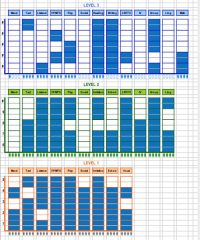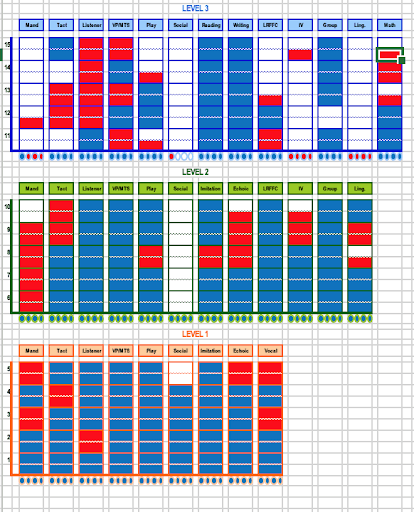As you know, choosing the right ABA team can be life-changing for a child with ASD and their family.

From our experience, the best results come when the team can achieve all 6 of these important goals: understanding the value of continued relationship building with parents, caregivers, and children, appropriate goal setting, treatment consistency, effective communication, meaningful data-tracking (making adjustments as indicated by data) and generalization across settings and providers.
Over the past several years, we have both started new ABA treatment programs with children who have never received quality ABA before, and rescued and revived failed ABA programs with children who were stagnating and/or regressing.
Below is a case example of a revived DOE-funded ABA program by our team from Manhattan Psychology Group (MPG) which showcases the expeditious results we can deliver via our top-level ABA services.
---------------------------
BACKGROUND
Jessica is a 12 year old female student (information changed for confidentiality) at a self contained, Autism Spectrum Disorder-focused year round school. She presents with global delays in all areas of functioning. Jessica has been receiving ABA services since early 2013; however, the number of hours designated for direct service and parent training, as well as the education levels of therapists have varied widely. At MPG’s first assessment, Jessica showed the most significant skill deficits in the area of functional communication. Specifically, she was unable to make her wants and needs known to others in a consistent or reliable way. At times this resulted in challenging behavior, including aggression, destruction and elopement. Her overall level of functioning was estimated to be that of a 15-month old.
FAILING ABA PROGRAM
When we received the initial referral for this case, Jessica had not received consistent ABA services for about 6 months. This was due to a number of different factors including:
- Poor communication within a team of independent contractors. There was no team leader, communication between providers and parents, consistent data collection or supervision and treatment planning being provided for Jessica and her family. This led to missed opportunities for data collection and a breakdown in treatment consistency between home and school.
- Confusion about licensure standards in New York State. Because the independent contractors were not part of a larger agency that monitored changes in required licensure, many providers were not properly credentialed and therefore unable to provide service within the confines of NYSED law. This created large treatment gaps and regression for Jessica.
- Parental dissatisfaction. Jessica’s parents were increasingly unhappy with a number of providers on the team and unable to resolve the ongoing issues mentioned above. Jessica’s forward progress had been stalled, and again due to the lack of clinical leadership over the independent providers, there was limited communication and no standard for session cancellation or scheduling changes.
OUR ABA TREATMENT PROGRAM
When MPG was referred this case, we immediately jumped into action. Our director of ABA services met with the family, prior therapists, and reviewed records and previous data to assist in initial goal development. We put together a team of licensed behavior analysts and experienced therapists, which included interviewing and hiring 3 of the existing team, letting go of 2 providers and bringing in 2 new providers. All therapists were made employees of MPG, and placed under the supervision of our director of ABA, an experienced licensed psychologist and behavior analyst. We also designated a team leader. Supervision and treatment planning was initiated to ensure ongoing data collection, assessment, and proper evolution of programming. Within two weeks of receiving the referral, our team was in place and ready to start servicing Jessica and her family.
Since February of 2019, we have been providing both school and home/community based services in the following capacity:
- 10 hours per week (2 hours per day) school push in Applied Behavior Analysis (ABA)
- 16 hours per week home based 1:1 ABA
- 4 hours per month ABA supervision
- 4 hours per month Parent Training and Counseling (PCAT).
Building upon the results of the initial skills assessment programs in the following areas were put into place for Jessica: manding (requesting) in varied ways, tacting (labeling) items, functions and prepositions, as well as giving directions (explaining how to do something). Each program is broken down into at least ten different specific program targets, all of which need to be introduced, mastered, and kept in generalization to be reassessed and revisited.
CURRENT STATUS & 6 MONTH OUTCOMES
Jessica mastered 47 program targets between February 2019 and August 2019. The VB-MAPP reassessment completed in August 2019 showed significant progress in the following areas: manding, tacting, listener skills (receptive language), matching, and math. Jessica made tremendous gains in the area of manding, specifically progressing from a 0-18 month range to skills within the 30-48 month range. Her score on the August VB-MAPP was a 134, which places her skills in the 30-48 month range. Overall, Jessica made over two years of developmental growth within 6 months.
The following visual shows the VB-MAPP skills based assessment, which is conducted every 6 months. Each box designates one developmental skill that is expected of a child within each age range. Moving up from the bottom, skills are designated into the 0-18 month range, 18-30 month range, and 30-48 month range.
The initial assessment (on the left in blue) shows skills mostly centered in the 0-18 month range of functioning (level 1), with functional communication skills (mand) being the lowest. The 6 month assessment (on the right) shows a very large number of additionally mastered skills (in red) centered mostly in 30-48 month range (level 3).
February 2019

August 2019






